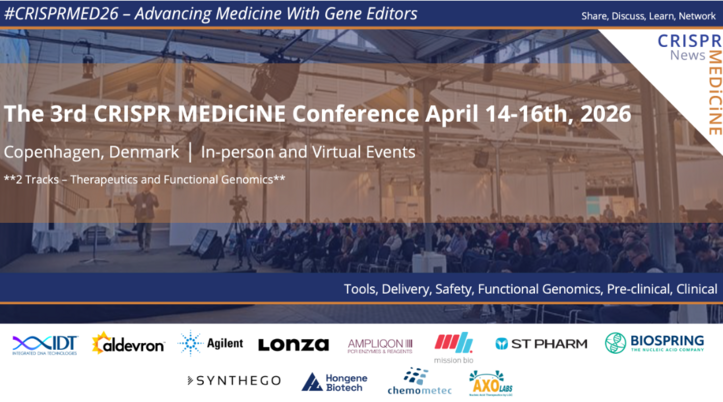Clinical Update: FDA Upgrades Status for Two Gene-Edited Therapies for Cancer and Sickle Cell Disease
FDA Orphan Drug Designation for ALLO-605 for the treatment of multiple myeloma
Allogene Therapeutics announced last week that the FDA has granted Orphan Drug Designation to its AlloCAR T candidate ALLO-605, which the company is developing for the treatment of relapsed or refractory multiple myeloma (MM) and other B cell maturation antigen (BCMA)-positive malignancies.
ALLO-605 is an allogeneic (healthy-donor derived) CAR-T cell therapy candidate that is TALEN-engineered to express a chimeric antigen receptor (CAR) that targets BCMA, a cell-surface protein universally expressed on malignant plasma cells. The candidate is currently being investigated in a Phase 1/2 trial in adults with relapsed or refractory MM.
ALLO-605 is the first product candidate in Allogene's TurboCAR™ portfolio. TurboCAR™ is a proprietary, next-generation platform technology based on programmable cytokine signalling that is designed to overcome the major challenges associated with CAR T-cell therapy, by controlling T cell exhaustion and improving T cell function and potency.
At the American Society of Hematology annual meeting in December 2020, Allogene Therapeutics presented pre-clinical data for ALLO-605, which demonstrated enhanced cytokine secretion, polyfunctionality, improved serial killing activity in vitro, and enhanced anti-tumour activity and survival compared to standard BCMA CAR-T cells in an aggressive mouse model for MM.
ALLO-605 was granted Fast Track designation by the FDA in June 2021 for the potential treatment of relapsed/refractory MM.
Orphan Drug Designation and Fast Track
The FDA's Orphan Drug Designation programme provides orphan status to drugs that are defined as being intended for the treatment, diagnosis or prevention of rare diseases that affect fewer than 200,000 people in the U.S. The designation qualifies the sponsor of the drug for certain development incentives that may include tax credits for qualified clinical testing, waivering of prescription drug user fees, or seven-year marketing exclusivity upon FDA marketing authorisation approval.
The FDA's Fast Track process is designed to facilitate the development and speed up the review of certain drugs to treat serious conditions and fill unmet medical needs.
FDA Grants Fast Track Designation to GPH101 for Treatment of Sickle Cell Disease
Graphite Bio announced yesterday that the FDA has granted Fast Track Designation to GPH101 for the treatment of sickle cell disease (SCD).
GPH101 is the first CRISPR-based therapy candidate designed to correct the point mutation in the haemoglobin subunit beta gene (HBB) that causes SCD. By targeting the root cause of disease, GPH101 is anticipated to provide a permanent cure for SCD. Correction of the HBB gene leads to a decrease in sickle haemoglobin (HbS) production and restores normal adult haemoglobin (HbA) expression, thereby restoring completely normally-functioning red blood cells.
The candidate is engineered using patient-derived haematopoietic stem cells (HSCs) that are edited with Cas9-sgRNA gene-editing machinery and a DNA repair template, in a mechanism that essentially cuts the mutation out of the genome and replaces it with the correct sequence. Cas9-sgRNA is delivered through ribonucleoprotein protein (RNP) complexes while corrected DNA template delivery is achieved through an adeno-associated virus 6 (AAV6) vector.
GPH101 will be assessed in the Phase 1/2 CEDAR trial, a multi-center, open-label study to evaluate the safety, efficacy and pharmacodynamics of the new therapeutic candidate in adult and adolescents with severe SCD. The trial will enrol approximately 15 adult and adolescent participants at up to five clinical trial sites in the United States. You can read more about GPH101 and SCD in a recent clinical trial update here.
You can find all our previous news articles about gene-editing clinical trials here. For a complete overview of CRISPR IND approvals and ongoing gene-editing trials, check out CRISPR Medicine News' Clinical Trials Database.
To get more of the CRISPR Medicine News delivered to your inbox, sign up to the free weekly CMN Newsletter here.
Tags
ArticleClinical News UpdatesMultiple Myeloma, MMSickle Cell Disease, SCDAllogene Therapeutics, Inc.Graphite Bio, Inc.
CLINICAL TRIALS
Sponsors:
Suzhou Maximum Bio-tech Co., Ltd.
Sponsors:
Zhejiang University







